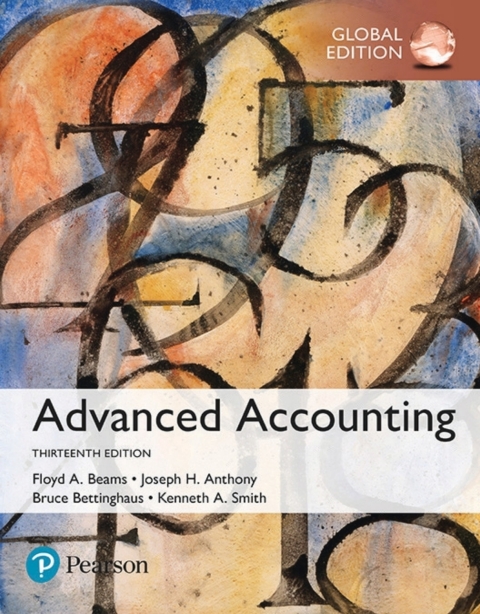Description
Efnisyfirlit
- Brief Contents
- Contents
- Preface
- Chapter 1: Business Combinations
- Reasons For Business Combinations
- Antitrust Considerations
- Legal Form of Business Combinations
- Accounting Concept of Business Combinations
- Accounting for Combinations as Acquisitions
- Disclosure Requirements
- The Sarbanes–Oxley Act
- Appendix: Pooling of Interests Accounting
- Chapter 2: Stock Investments—Investor Accounting and Reporting
- Accounting for Stock Investments
- Equity Method—A One-Line Consolidation
- Investment in a Step-by-Step Acquisition
- Sale of an Equity Interest
- Stock Purchases Directly from the Investee
- Investee Corporation With Preferred Stock
- Discontinued Operations and other Considerations
- Disclosures for Equity Investees
- Testing Goodwill for Impairment
- Chapter 3: An Introduction to Consolidated Financial Statements
- Business Combinations Consummated Through Stock Acquisitions
- Consolidated Balance Sheet at Date of Acquisition
- Consolidated Balance Sheets After Acquisition
- Assigning Excess to Identifiable Net Assets and Goodwill
- Consolidated Income Statement
- Push-Down Accounting
- Preparing a Consolidated Balance Sheet Worksheet
- Chapter 4: Consolidation Techniques and Procedures
- Consolidation Under the Equity Method
- Locating Errors
- Excess Assigned to Identifiable Net Assets
- Consolidated Statement of Cash Flows
- Preparing a Consolidation Worksheet
- Appendix A: Trial Balance Workpaper Format
- Consolidation Example—Trial Balance Format and Equity Method
- Appendix B: Preparing Consolidated Statements when Parent Uses Either the Incomplete Equity Method o
- Consolidation Under an Incomplete Equity Method
- Consolidation Under the Cost Method
- Chapter 5: Intercompany Profit Transactions—Inventories
- Intercompany Inventory Transactions
- Downstream and Upstream Sales
- Unrealized Profits From Downstream Sales
- Unrealized Profits From Upstream Sales
- Consolidation Example—Intercompany Profits From Downstream Sales
- Consolidation Example—Intercompany Profits From Upstream Sales
- Appendix: SEC Influence on Accounting
- The 1933 Securities Act
- The Securities Exchange Act of 1934
- The Sarbanes–Oxley Act
- The Registration Statement for Security Issues
- The Integrated Disclosure System
- Sec Developments
- Chapter 6: Intercompany Profit Transactions—Plant Assets
- Intercompany Profits on Nondepreciable Plant Assets
- Intercompany Profits on Depreciable Plant Assets
- Plant Assets Sold at other than Fair Value
- Consolidation Example—Upstream and Downstream Sales of Plant Assets
- Inventory Purchased for Use as an Operating Asset
- Chapter 7: Intercompany Profit Transactions—Bonds
- Intercompany Bond Transactions
- Constructive Gains and Losses on Intercompany Bonds
- Parent Bonds Purchased by Subsidiary
- Parent Purchases Subsidiary Bonds
- Chapter 8: Consolidations—Changes in Ownership Interests
- Acquisitions During an Accounting Period
- Piecemeal Acquisitions
- Sale of Ownership Interests
- Changes in Ownership Interests from Subsidiary Stock Transactions
- Stock Dividends and Stock Splits by a Subsidiary
- Chapter 9: Indirect and Mutual Holdings
- Affiliation Structures
- Indirect Holdings—Father-Son-Grandson Structure
- Indirect Holdings—Connecting Affiliates Structure
- Mutual Holdings—Parent Stock Held by Subsidiary
- Subsidiary Stock Mutually Held
- Chapter 10: Subsidiary Preferred Stock, Consolidated Earnings per Share, and Consolidated Income Tax
- Subsidiaries with Preferred Stock Outstanding
- Parent and Consolidated Earnings Per Share
- Subsidiary With Convertible Preferred Stock
- Subsidiary With Options and Convertible Bonds
- Income Taxes of Consolidated Entities
- Income Tax Allocation
- Separate-Company Tax Returns with Intercompany Gain
- Effect of Consolidated and Separate-Company Tax Returns on Consolidation Procedures
- Business Combinations
- Financial Statement Disclosures for Income Taxes
- Chapter 11: Consolidation Theories, Push-Down Accounting, and Corporate Joint Ventures
- Comparison of Consolidation Theories
- Illustration—Consolidation Under Parent-Company and Entity Theories
- Push-Down Accounting and other Basis Considerations
- Joint Ventures
- Accounting for Variable Interest Entities
- Chapter 12: Derivatives and Foreign Currency: Concepts and Common Transactions
- Derivatives
- Foreign Exchange Concepts and Definitions
- Foreign Currency Transactions other than Forward Contracts
- Chapter 13: Accounting for Derivatives and Hedging Activities
- Accounting for Derivative Instruments and Hedging Activities
- Accounting for Hedge Contracts: Illustrations of Cash Flow and Fair-Value Hedge Accounting Using Int
- Foreign Currency Derivatives and Hedging Activities
- Chapter 14: Foreign Currency Financial Statements
- Objectives of Translation and the Functional Currency Concept
- Application of the Functional Currency Concept
- Illustration: Translation
- Illustration: Remeasurement
- Hedging a Net Investment in a Foreign Entity
- Chapter 15: Segment and Interim Financial Reporting
- Segment Reporting
- Interim Financial Reporting
- Guidelines for Preparing Interim Statements
- Chapter 16: Partnerships—Formation, Operations, and Changes in Ownership Interests
- Nature of Partnerships
- Initial Investments in a Partnership
- Additional Investments and Withdrawals
- Partnership Operations
- Profit- and Loss-Sharing Agreements
- Changes in Partnership Interests
- Purchase of an Interest from Existing Partners
- Investing in an Existing Partnership
- Dissociation of a Continuing Partnership Through Death or Retirement
- Limited Partnerships
- Chapter 17: Partnership Liquidation
- The Liquidation Process
- Safe Payments to Partners
- Installment Liquidations
- Cash Distribution Plans
- Insolvent Partners and Partnerships
- Chapter 18: Corporate Liquidations and Reorganizations
- Bankruptcy Reform Act of 1978
- Liquidation
- Illustration of a Liquidation Case
- Reorganization
- Financial Reporting During Reorganization
- Financial Reporting for the Emerging Company
- Illustration of a Reorganization Case
- Chapter 19: An Introduction to Accounting for State and Local Governmental Units
- Historical Development of Accounting Principles for State and Local Governmental Units
- Overview of Basic Governmental Accounting Models and Principles
- The Financial Reporting Entity
- Comprehensive Annual Financial Report
- Chapter 20: Accounting for State and Local Governmental Units—Governmental Funds
- Recent Changes to Governmental Fund Accounting
- The General Fund
- Accounting for the General Fund
- Permanent Funds
- Capital Projects Funds
- Special Assessment Activities
- Debt Service Funds
- Accounting for the Debt Service Fund
- Governmental Fund Financial Statements
- Preparing the Government-wide Financial Statements
- Chapter 21: Accounting for State and Local Governmental Units—Proprietary and Fiduciary Funds
- Proprietary Funds
- Internal Service Funds
- Enterprise Funds
- Proprietary Fund Financial Statements
- Fiduciary Funds
- Preparing the Government-wide Financial Statements
- Required Proprietary Fund Note Disclosures
- Chapter 22: Accounting for Not-for-Profit Organizations
- The Nature of Not-for-Profit Organizations
- Not-for-Profit Accounting Principles
- Voluntary Health and Welfare Organizations
- “Other” Not-for-Profit Organizations
- Nongovernmental Not-for-Profit Hospitals and other Health Care Organizations
- Private Not-for-Profit Colleges and Universities
- Chapter 23: Estates and Trusts
- Creation of an Estate
- Probate Proceedings
- Administration of the Estate
- Accounting for the Estate
- Illustration of Estate Accounting
- Accounting for Trusts
- Estate Taxation
- Glossary
- Index
- A
- B
- C
- D
- E
- F
- G
- H
- I
- J
- K
- L
- M
- N
- O
- P
- Q
- R
- S
- T
- U
- V
- W







Reviews
There are no reviews yet.